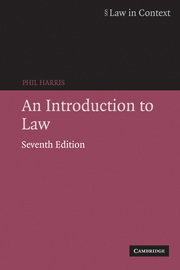Book contents
- Frontmatter
- Contents
- Preface
- Table of statutes
- Table of cases
- 1 Law and society
- 2 Law and morality
- 3 Law and the regulation of economic activity
- 4 Some important legal concepts
- 5 Law and property
- 6 Law and the settlement of disputes
- 7 The making of legal rules
- 8 The European dimension of English law
- 9 Liability in English law: the law of tort
- 10 Liability in English law: crime and the criminal justice system
- 11 The development and the role of the contract
- 12 Law and government
- 13 The legal profession
- 14 The judges
- Index
9 - Liability in English law: the law of tort
- Frontmatter
- Contents
- Preface
- Table of statutes
- Table of cases
- 1 Law and society
- 2 Law and morality
- 3 Law and the regulation of economic activity
- 4 Some important legal concepts
- 5 Law and property
- 6 Law and the settlement of disputes
- 7 The making of legal rules
- 8 The European dimension of English law
- 9 Liability in English law: the law of tort
- 10 Liability in English law: crime and the criminal justice system
- 11 The development and the role of the contract
- 12 Law and government
- 13 The legal profession
- 14 The judges
- Index
Summary
One of the most basic functions of law in any society is to specify the situations in which a person may be legally liable, that is, answerable to the law, for his or her acts or omissions. In English law, the major areas containing the fundamental principles of liability are crime, tort and contract, all of which, together with the important area of public-law regulation, have been briefly introduced in earlier chapters. In this chapter and the three following, the question to be discussed may be stated as follows: in what circumstances will the infringement of a legal obligation involve the imposition of legal liability, and hence some form of legal sanction, upon the violator?
The law of tort, or civil wrongs, incorporates as a basic general condition of liability the proposition that a defendant is only liable if that person is in some way ‘at fault’. As we saw in chapter 2, the proposition ‘no liability without fault’ is a general characteristic of English law: how, then, is this idea built into the law of tort?
Tort and capitalism
The high-water mark of the principle of ‘no liability without fault’ in English law was undoubtedly the nineteenth century. We have repeatedly noted how, in the twentieth century, the state intervened to regulate more and more areas of social and economic life, but the nineteenth century – the period of economic individualism and laisser-faire – saw minimal state interference with the business and commercial life of the community.
- Type
- Chapter
- Information
- An Introduction to Law , pp. 241 - 305Publisher: Cambridge University PressPrint publication year: 2006

